- Home
- Joel C. Rosenberg
Epicenter 2.0 Page 13
Epicenter 2.0 Read online
Page 13
Yet this was not the first time Putin had discussed such views or ambitions on the record. In 2000 three Russian journalists—Nataliya Gevorkyan, Natalya Timakova, and Andrei Kolesnikov—published First Person, in my view the most important book ever written about Putin. It is important not because the journalists offered their own insights or analysis into Putin but because they let Putin speak for himself. They interviewed the Russian leader six separate times. Each interview lasted about four hours. The book is merely a transcript, and when it comes to understanding Putin’s ambitions and approach, it is a gold mine of intelligence.145
Putin on his mission in life: “My historical mission,” he insisted, is to stop “the collapse of the USSR” (p. 139). To do this, he vowed to “consolidate the armed forces, the Interior Ministry, and the FSB [the successor to the KGB, the secret police of the Soviet Union]” (p. 140). “If I can help save Russia from collapse, then I’ll have something to be proud of” (p. 204).
On his style: “Everyone says I’m harsh, even brutal,” Putin acknowledged, without ever disputing such observations. “A dog senses when somebody is afraid of it, and bites,” he observed. “The same applies [to dealing with one’s enemies]. If you become jittery, they will think they are stronger. Only one thing works in such circumstances—to go on the offensive. You must hit first, and hit so hard that your opponent will not rise to his feet” (p. 168).
On the czars: “From the very beginning, Russia was created as a supercentralized state. That’s practically laid down in its genetic code, its traditions, and the mentality of its people,” said Putin, adding, “In certain periods of time . . . in a certain place . . . under certain conditions . . . monarchy has played and continues to this day to play a positive role. . . . The monarch doesn’t have to worry about whether or not he will be elected, or about petty political interests, or about how to influence the electorate. He can think about the destiny of the people and not become distracted with trivialities” (p. 186).
On his choice of history’s most interesting political leader: “Napoleon Bonaparte” (p. 194).
On his rise from spy to president: “In the Kremlin, I have a different position. Nobody controls me here. I control everybody else” (p. 131).
On his critics: “To hell with them” (p. 140).
Putin has repeatedly promised that he will not attempt to extend his time in office when his second term ends in 2008, and every person I interviewed in Russia in 2004—including every political officer and diplomat I spoke with at the U.S. Embassy in Moscow—told me they believed he would leave peacefully when the time came. Should he really do so, Putin will pass on to his successor executive power unparalleled since pre-Gorbachev times and a dynamic that suggests a future of more, rather than less, centralization of power.
But how seriously should Putin’s many pledges be taken? On at least six separate occasions after becoming president, he vowed not to end direct elections of Russia’s regional governors and appoint them himself. Yet in 2004, when it suited his purposes, he did just that.146 Why should his promise to leave office in 2008 be any different?
Now in his fifties, Putin is still a young man, at the top of his game, with no professional experience of any kind other than being a KGB-trained suppressor of dissidents and a rising political leader.147 What if he wants to change the constitution to allow himself to stay? Belarus did it in 2004 (and President Alexander Lukashenko was “reelected” in 2006 with 83 percent of the vote).148 Other ex-Soviet republics have done it as well, including Kazakhstan, Turkmenistan, and Tajikistan.149
What if Putin is looking for a pretext to become a new Russian monarch? Would a terrible new series of terrorist attacks—perhaps similar to the Beslan school hostage crisis—be enough? What about an assassination attempt or attempts at a coup or new revolutions in the former Soviet republics? What about polls showing that in the absence of Putin, the leading two contenders for Russia’s presidency are ultranationalist Fascist Vladimir Zhirinovsky and Communist hard-liner Gennady Zyuganov?150
Might “the will of the Russian people” suffice? In 2004 only 27 percent of Russians supported a third Putin term. (Perhaps this is why every expert I spoke with dismissed the possibility.) By June 2006, however, the number had shot up to 59 percent.151
Then again, support for Stalin is growing too. Asked if they would vote for the Soviet dictator if he were alive and running for president, a remarkable one in four Russians now say they would. In large measure this is because some two-thirds of the Russian people feel there is less order in their country today than in the past. As such, they are looking for a strong hand to rule, and Putin is providing just that.152
THE BIG QUESTION
The more one learns about the Russian leader, the more one can understand why nearly everywhere I speak these days, people ask me, “Is Vladimir Putin Gog? Is he the Russian leader Ezekiel predicted would attack Israel?”
It is an interesting question, given recent trends. Putin is certainly perceived as a rising czar. He speaks fondly of Russia’s historic monarchy. He is centralizing political power and control to himself. He is rebuilding Russia’s military for offensive purposes. He speaks of the collapse of the Soviet Evil Empire as a catastrophe and talks of restoring the historical glory of Mother Russia. He is operating in a social and political climate that increasingly desires a leader along the lines of Joseph Stalin. What’s more, he is steadily building political, economic, and military ties with the very countries Ezekiel described in his vision of the future, as I will describe in detail in the next two chapters.
All that said, however, one can neither definitively conclude that Putin is the one of whom Ezekiel spoke nor conclusively rule him out. Not yet, at least. More needs to happen in Russia and the Middle East before we can know for sure, one way or the other. Putin may, after all, simply be setting the stage for someone else to rise.
CHAPTER EIGHT: FUTURE HEADLINE
KREMLIN JOINS “AXIS OF EVIL,” FORMS MILITARY ALLIANCE WITH IRAN
On May 4, 2006, Vice President Dick Cheney delivered a speech at a conference in Vilnius, Lithuania, that infuriated the Kremlin.
He warned that while America wants to see Russia truly emerge as a healthy and vibrant democracy and a trusted partner in the global economy, under Vladimir Putin’s leadership, the country was in the process of reversing the gains of the last decade.
“In many areas of civil society—from religion and the news media, to advocacy groups and political parties—the [Russian] government has unfairly and improperly restricted the rights of her people,” Cheney said. He also warned that “no legitimate interest is served when oil and gas become tools of intimidation or blackmail, either by supply manipulation or attempts to monopolize transportation. And no one can justify actions that undermine the territorial integrity of a neighbor, or interfere with democratic movements.”
Russia’s leaders have a choice to make, Cheney explained. They can choose the path of freedom and democracy or the path of tyranny and aggression. He noted that the future of peace and security in the twenty-first century will be profoundly affected by the decisions Moscow makes in the coming years, and he insisted that Western leaders are optimistic.
“None of us believes that Russia is fated to become an enemy,” he said.153
It was a thoughtful, well-reasoned, and much-needed speech, and I was glad the White House chose to send such a strong message to President Putin and his top advisors. But that last line troubled me, for when one looks at Russia through not only the political and economic lenses but also through the third lens of Scripture, one sees that Russia is, in fact, destined to become an enemy of the West, and particularly of Israel, in part because of its alliance with Iran.
Let me explain.
WHAT TO WATCH FOR
A careful study of Ezekiel 38 makes it clear that a Russian leader will one day mount an attack against Israel. What’s more, we learn that Russia’s czar will not attack Israel alone. Rather, he will
build a military coalition—much as the United States did when it sought to bring down Saddam Hussein’s regime in 2003. Here Ezekiel provides us extraordinarily precise intelligence. Though he wrote more than 2,500 years ago, the Hebrew prophet was able to tell us what to watch for. In fact, he gave us a detailed list of countries that will join Russia’s anti-Israel coalition in the last days.
The first specific country he named as part of the Russian alliance was Persia (Ezekiel 38:5). Until March 21, 1935, Persia was the official name of the country we now call Iran. But never in the last 2,500 years have Russia and Iran had a military alliance. This caused many a skeptic to think, See, the Bible has no idea what it’s talking about. The Russians have always hated the Iranians. The Iranians have always hated the Russians. There’s no way they are ever going to form an alliance against Israel or anybody else. This just proves the Bible is full of errors.
Such a conclusion may have seemed reasonable to many until recently. The Russians, after all, briefly occupied portions of northern Iran several times: in the nineteenth century, in 1912, during World War I, and from 1941 to 1946. But Moscow has never had an alliance with Iran. To the contrary, repeated occupations by the Soviets drove Iran into a military alliance of sorts with the U.S. for several decades.
After the Red Army left Iran in 1946, Tehran established close relations with the United States as Mohammed Reza Shah Pahlavi (commonly known as “the Shah”) accepted large amounts of American military aid and arms to build a counterweight to Soviet ambitions to take over Iran’s oil fields and the rest of the Middle East.
In 1979, the U.S. lost Iran during the Islamic revolution as the Shah was overthrown and forced into exile and American embassy personnel were taken hostage for 444 days. But as serious a blow as this was to U.S. interests, the rise of the Ayatollah Khomeini hardly created the opening Moscow would have hoped for—or the one the Bible predicted. The fervently religious Khomeini had no intention of creating any semblance of an alliance with the atheists to the north. What’s more, after the Soviets invaded neighboring Afghanistan in December 1979, Khomeini feared the Kremlin was coming to take over Iran next.
It was Saddam Hussein, ironically, who forced Khomeini to begin forming ties to the Communists. By the late 1980s, Iran was suffering economically and militarily from year after year of a brutal and seemingly never-ending Iran-Iraq war (1980–1988). Tehran needed help from one of the superpowers, and they certainly were not going to turn to Washington. So Khomeini and the mullahs turned to Moscow instead, figuring that if Mikhail Gorbachev was pulling troops out of Afghanistan, he was not about to send them into Iran.
A MILITARY ALLIANCE EMERGING
Today, even the biggest skeptic of Ezekiel’s intelligence would have to admit that a military alliance between Russia and Iran is emerging for the first time in history.
Economic and political ties between Russia and Iran began to develop steadily in the 1990s. Military ties grew even more rapidly. Tehran was desperate to rebuild its forces after its long war with Iraq. Moscow was desperate for hard cash after the collapse of the Soviet Union and for a beachhead into the oil-rich Middle East.
It was a match made in hell.
The Clinton administration became concerned enough that in 1995 it pressured the Russians to sign an agreement whereby Moscow would stop selling arms to Iran and would promise to complete the delivery of all weapons systems previously sold to Tehran by the end of 1999. But the deal signed by Vice President Al Gore and Russian prime minister Viktor Chernomyrdin may go down as one of the least effective accords ever. Russian arms sales to Iran between 1992 and 2000 topped $4 billion.154
When Vladimir Putin took office as president, he quickly abandoned the 1995 agreement with the Americans. In December 2000, he sent Russian defense minister Igor Sergeyev to Iran to meet with Iranian defense minister Ali Shamkhani to begin discussing a dramatic new military relationship between the two countries. In March 2001, Putin welcomed Iranian president Mohammed Khatami to Moscow. Khatami was the first Iranian leader to visit the Russian capital in the twenty-seven years since the Shah’s visit.155 The visit made big headlines around the world and raised serious concerns in Washington and Jerusalem.
During his three-day visit, Khatami toured Russian nuclear facilities, missile factories, and Russia’s space command. Putin and Khatami and their advisors also accelerated negotiations for a ten-year, multibillion-dollar arms deal between their two countries, despite U.S. warnings to the Kremlin not to assist the radical Islamic regime.156
Over time, the nature of the relationship hammered out between the two countries has become even clearer, as evidenced by world media headlines:
RUSSIA PLANS 5 MORE NUCLEAR POWER PLANTS IN IRAN
Washington Post, July 27, 2002
NEW RAILWAY TO LINK RUSSIA AND IRAN VIA AZERBAIJAN
Agence France-Presse, May 22, 2004
RUSSIA FAVORS IRAN ROUTE FOR CRUDE EXPORTS
Tehran Times, June 14, 2004
PUTIN: IRAN DOESN’T PLAN TO BUILD ATOMIC ARMS
Aljazeera, February 18, 2005
PUTIN DEFENDS ARMS SALES TO SYRIA, IRAN
Associated Press, April 28, 2005
IRAN REGARDS RUSSIA AS POSSIBLE PARTNER TO BUILD 20 NUCLEAR POWER PLANTS
MosNews.com, September 7, 2005
KREMLIN READY TO DEFEND IRAN
MosNews.com, September 13, 2005
RUSSIA AGREES TO $1 BILLION ARMS DEAL WITH IRAN
Associated Press, December 2, 2005
IRAN’S NUCLEAR AMBITIONS
What makes all this so troubling, of course, is that the Kremlin is selling these conventional arms and providing such nuclear fuel, technology, and assistance to the most dangerous radical Islamic terrorist regime on the face of the planet, a country President Bush specifically cited as a member of the Axis of Evil.
Putin has tried repeatedly to assure world leaders that Iran does not intend to build nuclear weapons. After a February 2005 meeting in the Kremlin with Hassan Rowhani, Iran’s top nuclear negotiator, Putin insisted that “the latest steps on Iran’s behalf persuade us that Iran has no intention of building an atomic weapon. Consequently, we will continue to cooperate with Iran in all fields, including nuclear energy.”157 Two months later, during a news conference in Jerusalem on his historic trip to Israel—the first ever for a Russian leader—Putin explained that “we are working with Iran in order to develop the atom for peaceful ends and we are against any program seeking to endow Iran with an atomic weapon.”158
Yet the intentions of Iran to obtain nuclear weapons go back many years. During a January 1987 speech to Iran’s nuclear scientific community in Tehran, Iran’s then-president Ali Khamenei (who later became Iran’s Supreme Leader, the Ayatollah Khamenei, after the death of the Ayatollah Khomeini) made a direct link between Iran’s nuclear program and Iran’s national security and stressed the urgency of going nuclear as rapidly as possible.
“Regarding atomic energy, we need it now,” Khamenei said. “Our nation has always been threatened from outside. The least we can do to face this danger is let our enemies know that we can defend ourselves. Therefore, every step you take here is in defense of your country and your evolution. With this in mind, you should work hard and at great speed.”159
In an October 6, 1988, address to the Islamic Revolutionary Guards, Ali Akbar Hashemi-Rafsanjani made the country’s nuclear intentions even more clear. “We should fully equip ourselves both in the offensive and defensive use of chemical, bacteriological, and radiological weapons. From now on, you should make use of the opportunity and perform this task.”160 In 1989, Rafsanjani was elected president of Iran, where he served until 1997.
Lest there be any doubt, Rafsanjani was even more provocative in the wake of the terrorist attacks on New York and Washington. On December 14, 2001, the Iran Press Service ran a story entitled “Rafsanjani Says Muslims Should Use Nuclear Weapon against Israel.”161
According to the story, Rafsanjani asserte
d that a nuclear attack would “annihilate Israel,” while costing Iran “damages only.” He said, “If a day comes when the world of Islam is duly equipped with the arms Israel has in possession, the strategy of colonialism would face a stalemate because application of an atomic bomb would not leave anything in Israel but the same thing would just produce damages in the Muslim world.” The article pointed out that “not only [was] Mr. Hashemi-Rafsanjani’s speech the strongest against Israel, but also the first time that a prominent leader of the Islamic Republic openly suggest[ed] the use of a nuclear weapon against the Jewish State.”
To fulfill such a mission, Rafsanjani again ran for president in 2005. He was defeated by the even more hard-line and anti-Semitic Mahmoud Ahmadinejad—who vowed to accelerate Iran’s nuclear program—on the very day The Ezekiel Option was released.
The timing of Ahmadinejad’s victory and the book’s release was eerie enough, but eerier still were the similarities between the novel and what was happening in Iran in real life.
On page 333 of Option’s hardcover edition, my fictional Iranian leader calls for the annihilation of Israel, saying, “The world must understand—the Zionists must be humbled. Death to Israel. . . . This cancerous Jewish tumor is the most dangerous threat on the face of the earth. But the Night of the Jews is almost over. Allah, we beseech thee, annihilate them with your wrath.” On page 358, a fictional Islamic scholar who supports Iran in its battle against Israel warns that “Allah is not on the side of the Jews. He will not be mocked by claims that he is. The world will know who the One True God really is when Israel is wiped off the face of the map forever.”

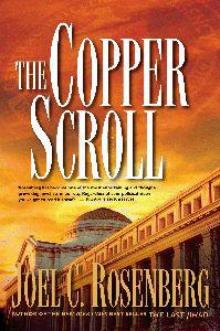 The Copper Scroll
The Copper Scroll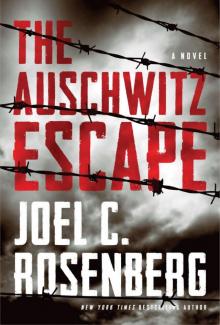 The Auschwitz Escape
The Auschwitz Escape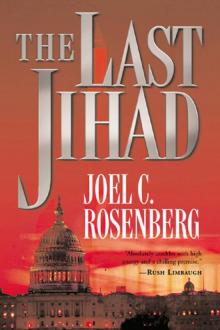 The Last Jihad
The Last Jihad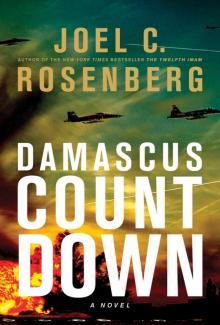 Damascus Countdown
Damascus Countdown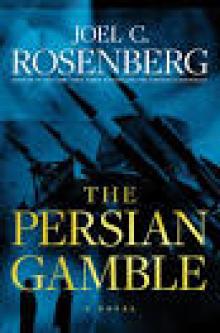 The Persian Gamble
The Persian Gamble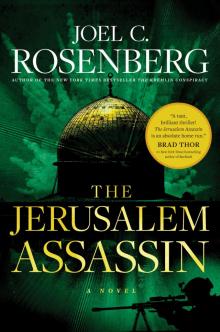 The Jerusalem Assassin
The Jerusalem Assassin Dead Heat
Dead Heat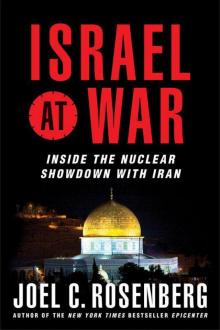 Israel at War: Inside the Nuclear Showdown With Iran
Israel at War: Inside the Nuclear Showdown With Iran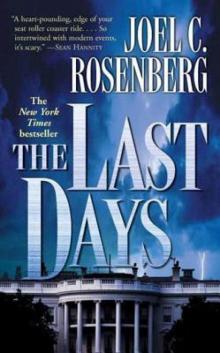 The Last Days
The Last Days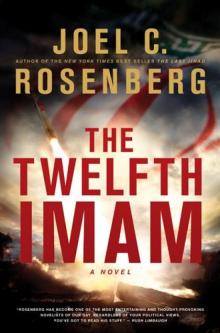 The Twelfth Imam
The Twelfth Imam Epicenter 2.0
Epicenter 2.0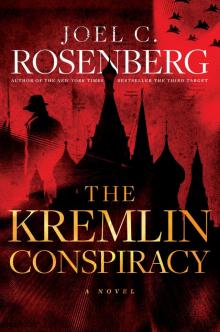 The Kremlin Conspiracy
The Kremlin Conspiracy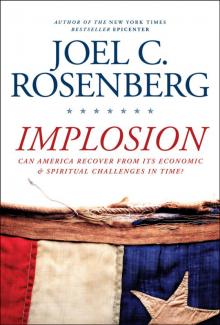 Implosion: Can America Recover From Its Economic and Spiritual Challenges in Time?
Implosion: Can America Recover From Its Economic and Spiritual Challenges in Time?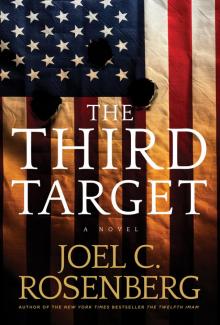 The Third Target: A J. B. Collins Novel
The Third Target: A J. B. Collins Novel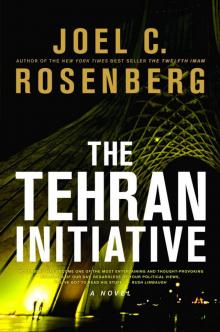 The Tehran Initiative
The Tehran Initiative Inside the Revolution
Inside the Revolution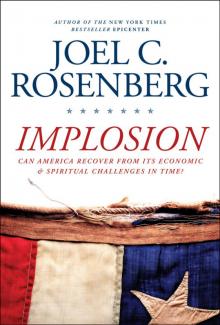 Implosion
Implosion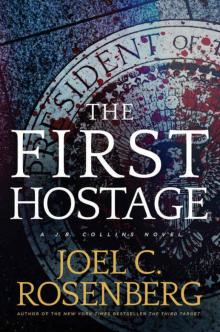 The First Hostage: A J. B. Collins Novel
The First Hostage: A J. B. Collins Novel